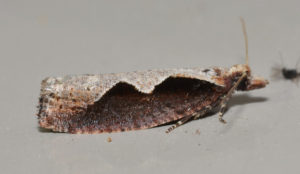Cornucopia’s Take: The genetically engineered male Diamondback moth causes death to native female Diamondback moths it mates with. This trait has been bioengineered to reduce populations of the native moth, a pest to brassica plants. Cornucopia concurs with NOFA-NY that a comprehensive, independent health, safety, and environmental review must be completed before they are introduced into the environment.
NOFA-NY Denounces USDA Permit to Release Genetically Engineered Moths in Geneva, NY
NOFA-NY
NOFA-NY DENOUNCES USDA PERMIT TO RELEASE GENETICALLY ENGINEERED MOTHS IN GENEVA, NY
 |
Source: Andy Reago & Chrissy McClarren |
Farmington, NY — The Northeast Organic Farming Association of New York (NOFA-NY) today denounced
the USDA’s permit for the world’s first open-air trials of the Genetically Engineered (GE) Diamondback moth to be released in Geneva, NY. This announcement came concurrently with the availability of a final environmental assessment and finding of no significant impact for the field release of the GE Diamondback moths. NOFA-NY considers the Environmental Assessment lacking comprehensive health and environmental details.
“NOFA-NY considers the release of a novel genetically engineered organism to be a major activity with potentially significant and heretofore unknown health and environmental effects,” said NOFA-NY Policy Advisor Liana Hoodes. “It is now up to New York State Department of Environmental Conservation (DEC) to ensure the safety of its citizens before granting the necessary state permit. We call on the NYS DEC to require a full environmental impact statement and public hearings during a complete review under State Environmental Quality Review Act.”
Hoodes goes on to say, “most of the USDA’s environmental assessment confines its review to the general impacts of the new technology, yet neglects to adequately assess the potential impacts of the trials themselves on farms and residences near the New York State Agricultural Experiment Station in Geneva, NY and across the state.”
NOFA-NY is concerned that the owner of this technology (originally, Oxitec UK – now Intrexon) never completed a comprehensive, independent health, safety, and environmental review required by international protocols prior to bringing this organism to the United States.
The Diamondback moth is a pest to brassica plants worldwide. The purpose of this new GE insect would be to reduce pest populations of Diamondback moths through engineering a new female lethality trait into male GE moths. Thousands of these males mate with wild females who produce eggs that are laid on the brassica, then the females die. The GE males continue the cycle and suppress the numbers of wild Diamondback moths.
Before such an open air release can happen, Cornell University must apply to the New York State DEC for a permit. Typically, Cornell research permits receive cursory review by the Department, but because this is the first world-wide release of a new insect, NOFA-NY believes in the strongest terms that this action should trigger a full environmental review under the State Environmental Quality Review Act. Such review must include a public hearing to determine the contents of a Full Environmental Impact Statement.
Both Cornell University and the technology owner Intrexon must fulfill their responsibilities to the citizens of the State for full disclosure of potential impacts prior to releasing such an organism into our air. Without a full environmental review, NOFA-NY believes this experiment must be stopped.
See NOFA-NY’s requests to NYS DEC (2) for full environmental review: http://bit.ly/2tR2xU4
See NOFA-NY comments to the Environmental Assessment: http://bit.ly/2tpEr21
See NOFA-NY General GE Moth Fact Sheet: http://bit.ly/2m0PEk0
See USDA’s announcements: http://bit.ly/2tVWOgd

